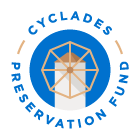The challenge
The heavy impact of recreational boat tourism, particularly unregulated anchoring on Posidonia oceanica meadows in the Cyclades is a significant concern due to its adverse effects on the meadows condition. Boat anchors and chains directly damage Posidonia meadows by uprooting or crushing the seagrass plants. This physical damage disrupts the structure and integrity of the meadows, reducing their ability to provide habitat and support biodiversity in the marine ecosystem.
Did you know?
Did you know that Posidonia oceanica is not algae but a living plant with deep roots, leaves, flowers, and fruits just like the plants on the land? Commonly known as ‘Neptune grass’, Posidonia oceanica is an endemic species of the Mediterranean, considered thus emblematic for the Mediterranean peoples –the underwater equivalent of the olive tree. When the conditions for its development are favourable, the Posidonia plant forms extensive underwater meadows, which, in very clear seas, can even exceed the depth of 40 meters. Posidonia oceanica meadows are incredibly precious and are one of the primary sources of oxygen for the marine ecosystem. They can produce 14-20 litres per square meter daily in the Mediterranean! Thanks to photosynthesis they absorb CO2, much more than a forest! These meadows host and feed hundreds of species, acting as a nursery for numerous fish. They also protect the coasts as they lower the swell, while the Posidonia banquettes (piled withered Posidonia leaves on the beach) act as a natural breakwater protecting our beaches from the erosive action of the waves.
The solution
Informative boards in marinas, community engagement activities for the promotion of sustainable tourism practices, and awareness raising campaigns among recreational boaters, charter companies, and tourists, are some of the measures which contribute to Posidonia meadows protection and to responsible anchoring practices adoption. Towards this direction, CPF has designed and has been implementing the CYCLADES POSIDONIA ALERT initiative.
The program aims to inform and sensitize boat/yacht owners, tourists, and the local population on the importance and vulnerability of the Posidonia meadows in the Cyclades and mitigate uncontrolled anchoring impact.It includes informative and raising awareness events for boat/yacht users, tourists and locals, educational activities for local schools (Posidonia Alert Kids) and establishment of informative boards. The initiative is co-funded by the Seacology Foundation and Edmiston Yachting and being implemented with the collaboration of the Hellenic Centre for Marine Research (HCMR) and local partners.
Achievements
Up to now, we have organized events in 11 Cycladic islands, with more than 450 participants: marine users, tourists, local stakeholders and authorities. We have established 18 informative boards in more than 17 marinas and key/popular bays and implemented 24 educational and raising awareness events in local schools with more than 900 participants: students and teachers.
Learn more for the Cyclades Posidonia Alert Kids, here.
Initiative updates
The expansion of the Cyclades Posidonia Alert campaign to the islands of Sifnos and Syros was made possible thanks to the additional funding approved for the CPF through the Development Agency of Cyclades S.A. (NSRF). Learn more here.
April, 2022
https://cycladespreservationfund.org/cyclades-posidonia-alert-learning-by-drawing/
February, 2022
https://cycladespreservationfund.org/cyclades-posidonia-alert/
June, 2021
https://cycladespreservationfund.org/cyclades-posidonia-alert-on-andros/
Useful material
“YACHTING & THE ENVIRONMENT” guide – available in English and Greek.
Educational material, including presentations, and games
Learn moreabout theCyclades Posidonia Alert campaign and how to become part of the solution here: Info available in English, Greek, French, Italian.
CPF is a proud member of the “Mediterranean Posidonia Network”, which aims to bring together different stakeholders such as authorities, scientists, international environmental organizations, professionals including yachting agents, marinas from the Mediterranean countries. These actors are concerned with the protection of Posidonia oceanica, threatened by various pressures such as anchoring. The objective is to increase each country’s capacity building to better protect Posidonia oceanica and prevent its future degradation.
